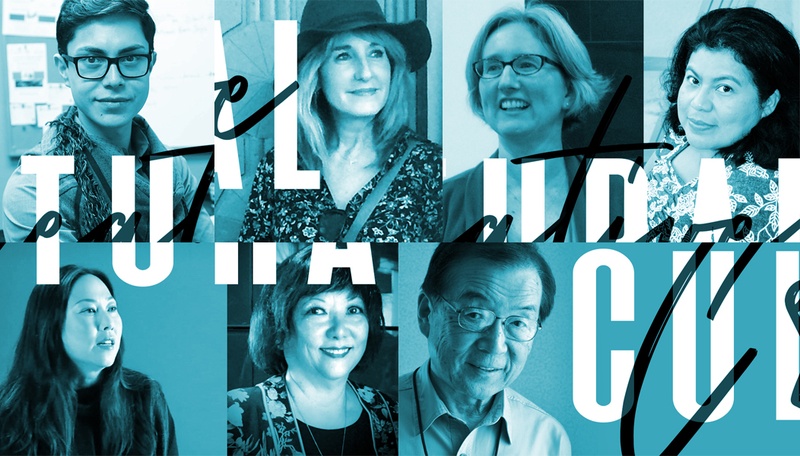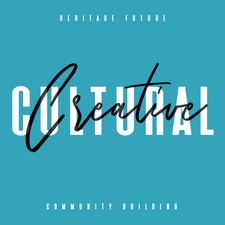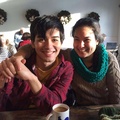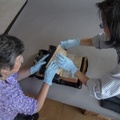Trevor Allred is a founding part of Heritage Future, a nonprofit organization dedicated to storytelling as a tool for community betterment, and a moderator on the Creative + Cultural podcast. In “Chapters,” a five-part podcast series dedicated to stories surrounding the exclusion, forced removal, and incarceration of Japanese Americans with a paralleled narrative thread through Deferred Action for Childhood Arrivals (DACA), he interviewed the following historical and active figures in the community offering multiple backgrounds and perspectives to the issue.
- Mary Adams Urashima provides an environmental justice background through her preservation efforts to save the Furuta Goldfish Farm and Wintersburg Japanese Mission property in Huntington Beach, CA.
- Dr. Kristine Dennehy, a history professor at California State Universtiy at Fullerton and former Historical Advisor for an oral history project on Japanese American veterans formerly in the Millitary Intelligence Service, addresses the issue of information in society today.
- Dr. Stephanie Takaragawa, an Associate Professor of Sociology who wrote her dissertation on the Japanese American National Museum (JANM) examining the role of the museum in the construction and dissemination of a Japanese American identity, touches upon her own experience as a Nisei, and the significance and necessity of JANM within the current generation.
- Patti Hirahara has been an advocate in preserving the Japanese American legacy in the U.S. and was a featured speaker at the FDR Presidential Library and Museum. She shares the story of her family’s over 2,000 photographs that were processed in a secret underground darkroom in the Wyoming Japanese incarceration camp during WWII.
- Sam Mihara shares his personal story and experience as a Nisei in the Heart Mountain, Wyoming Japanese concentration camp. He is currently a regular visiting lecturer and national speaker on the topic of mass imprisonment at locations within the U.S. such as the National Council of History Educators, University of California at Berkeley, University of California at Los Angeles, and the U.S. Department of Justice.
* * * * *
Please tell me about the creation of your project Chapters. What is the goal/purpose/vision for this project? What inspired you to focus on Japanese/Japanese American history?
The name of the series hints at the overall scope. In short, each episode is a chapter in a manual of how to preserve and prevent certain histories. As an organization dedicated to storytelling, we use stories to extract essential tools for community betterment. Each episode ends with the guest or guests recommending resources where people can learn more or get involved. This project would not have been possible without the support the California Civil Liberties Public Education Program. With the California State Library’s support, we were able to contribute in the preservation of this history for the sake of history and future.
Could you give a little bit of your own background? What is your connection (if any) with the Japanese American community? For example, ancestors, friends, community, personal identity, etc?
Apart from a few friends, I don't have much of a personal connection to the Japanese American community. As someone who aspires to be an ally for good, and as a part of a company that seeks to build bridges, it simply felt like this was a good thing we could offer. Inclusiveness, community, and remembering are worth fighting for, and these are things we can all work towards. For myself, I am simply a poet, which also means that I am trained in listening. This seemed like my only saving grace for the role I played in the series and, I think, better explains in what way I was truly honored to moderate such a program.
Each interviewee came from very diverse backgrounds of education, occupations, and family history. How did you come into contact with these leaders? What about their stories prompted you to choose to interview these people?
With the scope of this series, we wanted to make sure we could learn of the history, but further move this into contemporary issues. We knew we therefore needed guests who could speak with a historical perspective, but still with a personal touch. This combination helped place this history in today with a sense of “now.” All of the quests offered expertise from various perspectives to this end.
What stood out the most to you from the interviews in terms of people’s stories or words of wisdom they offered?
It shocked me to learn of the silence that surrounded this history among surviving families. It reaffirmed to me how brave the simple act of sharing one’s story truly can be. Who knows what would have happened without communal efforts to preserve this history, but understanding bravery at this level better informs the many ongoing efforts to keep the story available and as a part of the future.
At one point in the podcast, you identified a common theme within the series, which was the “issue of information” through lack of communication. There were many times in U.S. history where valuable information remained a secret between dominant powers, as well as individuals. Would you like to speak more on this theme and its importance/necessity in our society today?
This question and our mission have a common root. We are dedicated to storytelling because we believe it is the best way to share the most vital of information, personalb and cultural heritage. What we want here is to work as a bridge between communities, sharing vital stories and speaking against forgetting. Historical thinking is the same as storytelling for us, and we seek to create a place that supports this. In this way, our cultural center is a home for this exchange or communication.
What do you hope listeners will take away from listening to your podcasts?
I would hope listeners would leave with a sense of how historic issues reach into the present and how history should inform our actions. Each episode offered incredible stories and resources to prepare any listener who wants to play a role in history, whether through learning more or where to take action.
What do you hope to take away from completing this project?
Firstly, I feel it necessary to simply state what an honor and privilege it was for me to offer a platform to such key community members and stories as the moderator of the program. From this, I had hoped to see how strangers could come together and offer their pieces in creating a fuller history together. I was thrilled to see this project completed with such rich voice and sincerity. Of course, there is much more work to be done here, but I believe this was a great first attempt.
Are you currently working on (or have future plans to work on) related projects pertaining to Japanese/Japanese American history and culture?
We are, in fact. Currently, we are drafting possible next steps for another podcast series, but our 1888 Center in Old Towne Orange is a cultural center for storytelling where will have the chance to showcase more through gallery exhibitions, visiting authors, or workshops.
* Visit Chapters for more information on the project and to listen to the podcasts.
© 2019 Kate Iio







